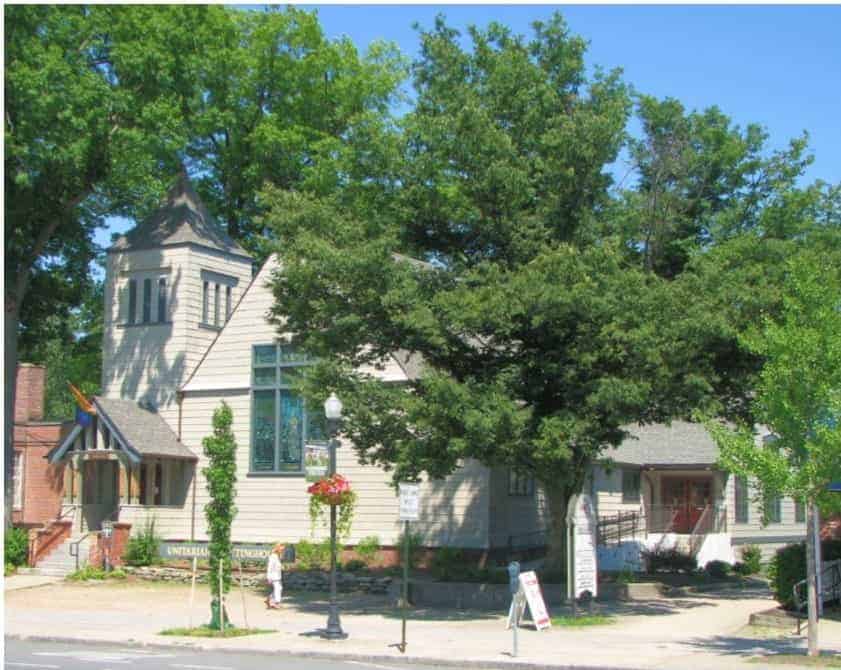Census of Amherst’s 6000 Public Trees Will Enhance Management of Our Urban Forest

Unitarian Universalist Society of Amherst Meeting House. Photo: Unitarian Universalist Society of Amherst
The following column appeared previously in the Amherst Bulletin.
How many trees grow along the streets of Amherst? What’s the most common species? Are our street trees healthy, and how does the climate crisis affect them?
The town of Amherst recently attempted to answer these questions and more. With funding from the Massachusetts Department of Conservation and Recreation, the town hired a company for a census of the trees along its streets. The resulting tree inventory identified more than 6,000 public trees and rated their conditions and need for care.
The tree inventory will guide the Amherst Public Shade Tree Committee, Tree Warden Alan Snow, and the DPW on how to care for our urban forest, keep residents safe, and where to plant more trees. The inventory covered only public shade trees — trees within the town right-of-way measuring 6 inches in diameter or greater at breast height — and it only surveyed trees on nonforested streets. (Trees on forested streets naturally grow and die and generally do not require active management.)
Here are some interesting facts from the study and what they mean for Amherst.
1. The inventory identified 159 different species of trees! Who knew we had so many? Red maple is the most common. Over 80% of the trees are in good or fair condition.
2. The inventory found 233 dead trees and 827 trees in poor condition. Growing along roads, public trees face stronger winds than forested ones. They contend with contaminated soils from road salt and chemicals, severed roots from repaving, and soil compaction, all of which negatively impact tree health.
What determines a “poor” rating? While trees can appear healthy, they may have internal structural defects, hidden decay, dying crowns, or they may simply fail to thrive. These trees pose a danger to people, cars and nearby buildings. Dead trees obviously require removal, along with those in the poorest condition. Some may be saved with extensive pruning. We always aim to replace lost trees as soon as possible.
3. The inventory noted that more than one-third of our public street trees are maples, including 769 sugar maples. Sugar maples have been especially hard hit by climate change as they generally benefit from colder winters and cannot tolerate extended droughts. The inventory also identified 131 ash trees, 38 beeches, and 192 hemlocks. All these trees will most likely succumb to invasive insects and diseases, which will be a huge loss to the town’s tree canopy.
We thoughtfully and intentionally diversify the species we plant. We do not want a repeat of the American elm disaster when many previously elm-lined streets (often named “Elm Street”) suddenly ended up devoid of trees. Knowing which trees are rare in town but also able to tolerate street conditions helps us choose species for future plantings.
4. The Amherst Public Shade Tree Committee has already made use of the inventory’s valuable data to inform which trees to grow in our new town tree nursery, located on Station Road. We selected black gum, sourwood, white fir, and bur oak as the species to add to the nursery next year.
5. Future tree work, besides the removals, will include pruning of healthy trees to remove dead limbs, correct structural problems, and eliminate branches that will eventually obstruct traffic or interfere with utility wires. We will also prune young trees to ensure healthy growth and to minimize maintenance.
Please reach out to us with questions and comments at shadetreecmt@gmail.com. Or attend our meetings on the second Tuesday of each month at 5:30 p.m., or volunteer to plant new trees with us.
Henry Lappen is chair of the Amherst Public Shade Tree Committee.
